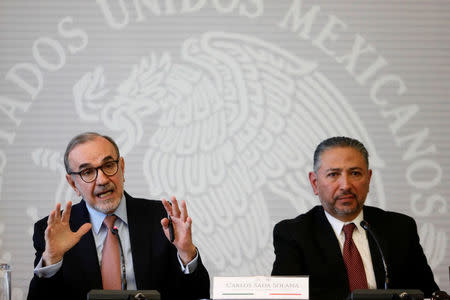Mexico says upcoming U.S. execution of national is 'illegal'
MEXICO CITY (Reuters) - Senior Mexican diplomats on Monday condemned the upcoming execution of a Mexican inmate on death row in Texas, calling his sentence "illegal" and vowing to exhaust all possible efforts to prevent him from being killed later this week. In a news conference in Mexico City, Carlos Sada, Mexico's deputy foreign minister for North America, told reporters that Texas prosecutors did not follow due process in the case of Ruben Cardenas, who was sentenced to death for raping and killing his 15-year-old cousin in 1997. "From the start, there has been a failure, and from our perspective, this is an illegal act," Sada said. The planned execution comes as relations between Mexico and the United States are at a low, hurt by U.S. President Donald Trump's vows to build a wall along the Mexican border, and his threats to end the North American Free Trade Agreement (NAFTA). Cardenas, who is due to die on Wednesday, was not given the chance to speak with consular officials in contravention of the Vienna Convention on Consular Relations, Sada said. He added Mexico would look to stay the execution by seeking to overturn how Cardenas' confession was obtained, while also looking to exonerate him with up-to-date DNA testing. There are currently two separate appeals under way and Mexico is willing to take Cardenas' case all the way to the U.S. Supreme Court if necessary, Sada added. Mexico does not have the death penalty and opposes it, regularly clashing with the United States when Mexican nationals are set to be executed on U.S. soil. Sada said 54 Mexicans were currently facing U.S. death sentences. The International Court of Justice (ICJ) in The Hague ruled in 2004 that the United States had violated international law by failing to inform 51 Mexicans now on death row of their right to consular assistance, and said the cases should be reviewed. Alejandro Alday, a legal advisor to the Mexican government, said Cardenas was one of the 51 covered by the ICJ ruling, and accused Texas of breaching the Vienna convention in failing to advise Cardenas of his right to consular assistance. (Reporting by Gabriel Stargardter; Editing by Sandra Maler)




